Mask-wearing has become a political signal in the US – but not in the UK, say Chris Anderson and Sara Hobolt (LSE), where there is little difference between the willingness of Conservative, Labour and Lib Dem supporters to wear them. When asked about their motivations, however, partisan differences emerge – also between Leavers and Remainers.
“I don’t see it for myself. I just don’t.” This was President Donald Trump’s reply when asked in April whether he personally would wear a face mask. Beyond the personal, Trump made face masks political, repeatedly mocking his opponent Joe Biden for wearing a mask during the presidential campaign.
In Britain, too, masks were not an immediate priority as the pandemic progressed. The government was initially reluctant to recommend that people wear masks, saying that there was insufficient evidence to prove they worked. Even as schools reopened after the summer holidays and with many requiring students and staff to wear them, Prime Minister Boris Johnson described the idea of face masks in classrooms as “nonsensical”.
While face masks are now compulsory in the UK in public indoor settings and have become commonplace across the world as a primary tool to stop the spread of the COVID-19 virus, they continue to be controversial in some quarters and have become politicised in a number of countries. It is easy to see why. Wearing face masks is unfamiliar and, to many, an unwelcome intrusion. Moreover, because they are visible, masks have the potential to become a political signal. During much of the US presidential election campaign, for example, wearing a mask (or not) served as a way to show partisan allegiance. Not surprisingly, perhaps, data from the US have shown that the decision to wear masks is strongly influenced by people’s partisan identity, with Democrats more than 20 percentage points more likely than Republicans to report wearing masks in public (75% and 53% respectively).
Do we find a similar partisan divide in the willingness to wear a mask in the UK? After months of evolving advice on the need to wear a mask and equivocal signals from top government officials, how willing are people to wear one?
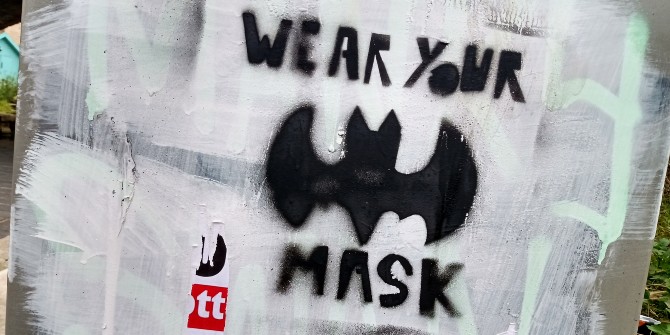
To better understand what motivates people in the UK to wear a mask, we fielded a nationally representative survey of the British public with the help of YouGov and the British Academy in September 2020. Unlike the emerging evidence from the US, we find no clear partisan or political divide in the willingness to wear masks in the UK. However, there are some differences when it comes to people’s motivations for wearing masks.
Changing advice on masks
Unlike other European nations such as Italy, the British government and its scientific advisors did not mandate or recommend masks during the early days of the pandemic. As a result, the British public was slow to adopt masks as a way to contain the spread of the virus. In fact, as data collected by YouGov show, the UK public initially lagged behind Italy, China, USA and Germany with regards to face coverings. However, as the government’s advice changed, Brits became increasingly willing to wear masks. In the early summer, only slightly over a third of the British public said they regularly wore masks in public. But by early September and all the way into November, three-quarters said they did so.
Figure 1: People saying they wear a face mask in public places (%)
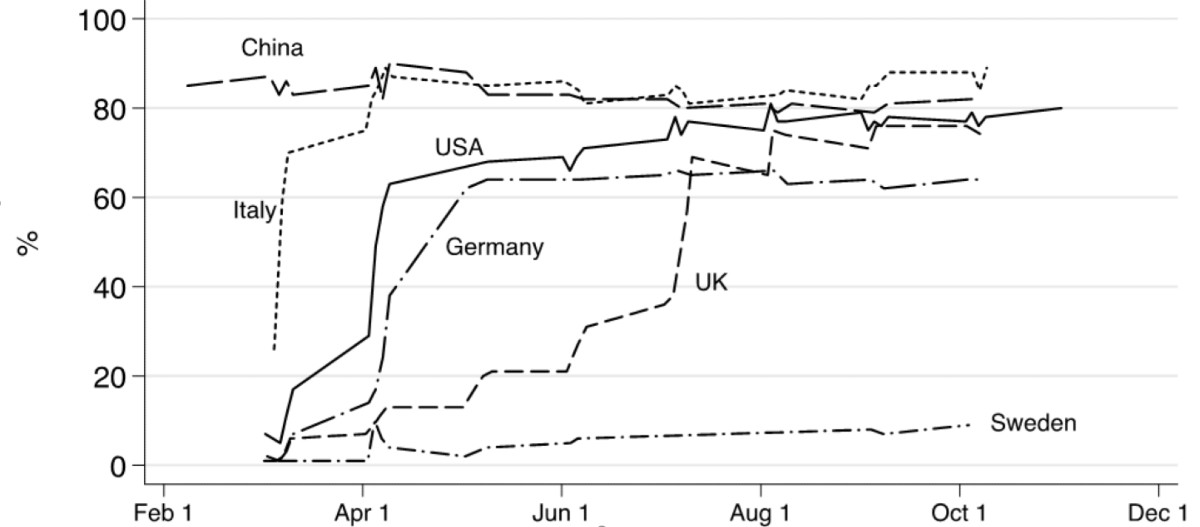
Source: YouGov
How willing are people to wear masks?
Very willing, it turns out. When we asked a representative sample of Brits how willing they were to wear one, regardless of whether they do so regularly, a vast majority of the British public – 87% – now say they are “very” or “quite” willing and only a tiny minority (3%) said they are “very unwilling” to wear one.
Figure 2: In general, how willing or not are you to wear a face mask or covering in public settings? (%)
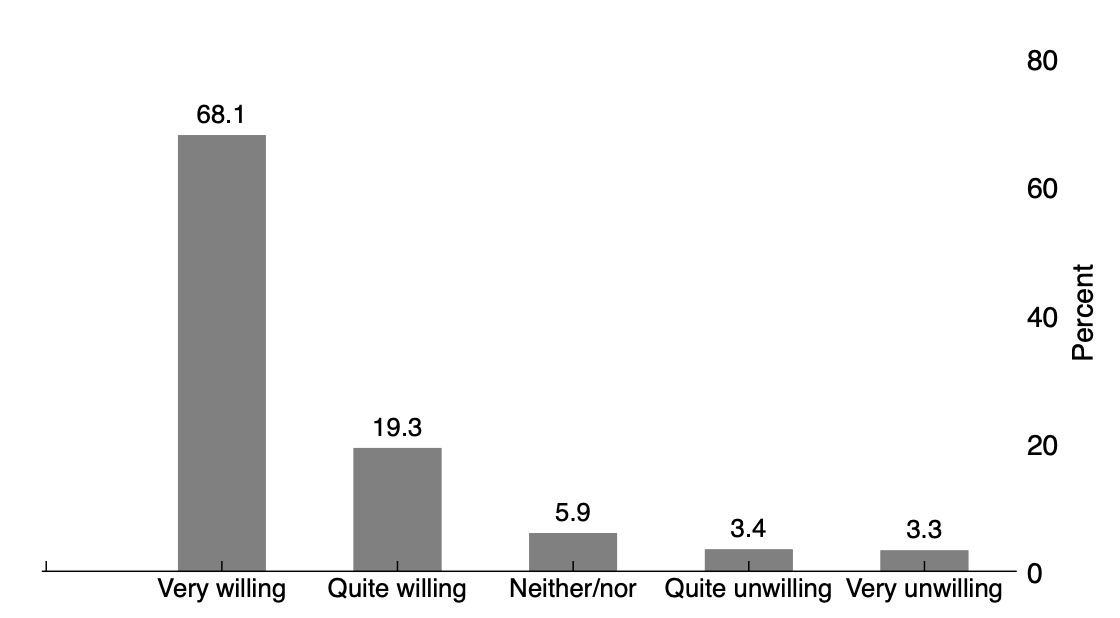
Source: Anderson and Hobolt / YouGov
While a significant majority of people is in principle ready to follow public health advice on wearing masks, opinions are more differentiated when it comes to what the rules should be around masks – who should make the rules and who should enforce them.
What should be the rules and who should make them?
When asked whether masks should be mandatory or where they should be worn, a large majority of Brits say should be mandatory, with only 14% indicating they should not. At the same time, only 27% of respondents told us that they thought masks should be mandatory inside as well as outside, with a majority (54%) preferring masks only to be mandatory in indoor public spaces. So the government mandate to wear masks no longer seems controversial in the UK, but the devil is in the detail, with most respondents most comfortable with an indoor mask requirement.
Figure 3: Preferred mask rules
Which of these statements comes closest to your views? (%)
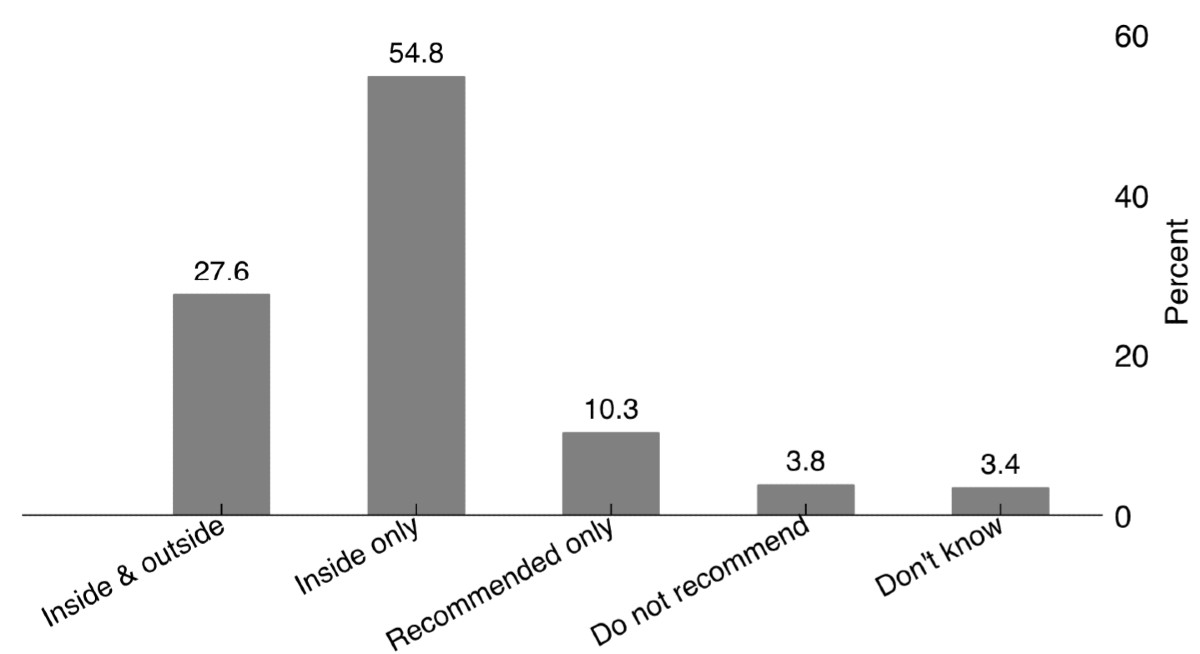
Source: Anderson and Hobolt / YouGov
When it comes to who should be in charge of making the rules about masks, here too we see a somewhat divided British public: when given a choice between public health experts, the government in Westminster, and devolved governments/ local authorities, roughly half say they want public health experts to make the rules, with the rest of the public choosing variously either the UK government or others. Notably, though, only a quarter (27%) of the public suggested that they preferred the government in Westminster to make rules about masks. Taken together, our data suggest that a majority of Britons are more comfortable with non-political experts rather than political decision-makers being in charge of key public health mandates.
Figure 4: Who should make the rules?
In your opinion, who should have the authority to decide when and where face coverings should be worn? (%)

Source: Anderson and Hobolt / YouGov
No clear partisan divide – except in why we wear masks
But do we see the kind of partisan differences in attitudes towards masks that have been so evident in the US?
We generally expect partisan supporters to take ‘cues’ from political leaders, but in the UK the major parties have been far more aligned in their messaging on masks that they have in the US. It is therefore not surprising that we find near-identical levels of willingness to wear masks among partisans of different stripes in Britain.
Figure 5: Willingness to wear masks, by political party
In general, how willing or not are you to wear a face mask or covering in public settings? (5= very willing / 1=very unwilling)
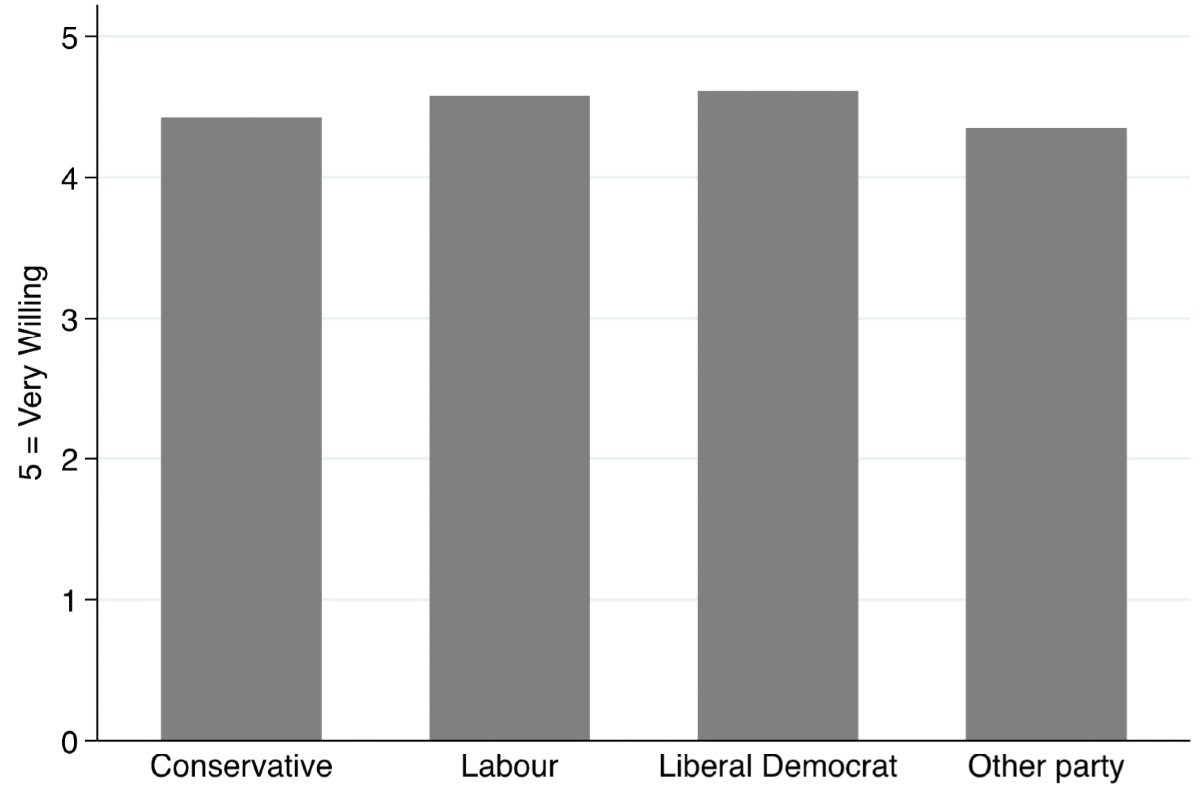
Source: Anderson and Hobolt / YouGov
While partisans of all persuasions report a high level of willingness to wear masks, Labour supporters and Liberal Democrats prefer health experts to make the rules around mask wearing (68% and 57% respectively), whereas Conservative supporters are evenly split as to whether the government or health experts should make the rules (42%).
Moreover, the reasons people wear masks vary along partisan lines. When we asked why they wear masks, partisans are equally likely to say they wear them to protect themselves. However, Tories were also significantly less likely than supporters of the Labour and Liberal Democrat parties to say they wear them to protect others.
Figure 6: Reasons for wearing masks, by political party
When it comes to wearing masks or face coverings, which of these represents your views? Tick all that apply (%)

Source: Anderson and Hobolt / YouGov
While much has been written in recent years about an emerging conflict line between so-called Leavers and Remainers in British politics, we don’t find notable differences with regard to people’s willingness to wear a mask. Across the board, Leavers and Remainers reported a high level of willingness to wear masks, though we see the same differences in why they do so that we see when looking at partisan subgroups: Leavers were significantly less likely to say that they wear masks to protect others.
Figure 7: Reasons for wearing masks, by Leave/Remain support
When it comes to wearing masks or face coverings, which of these represents your views? Tick all that apply (%)
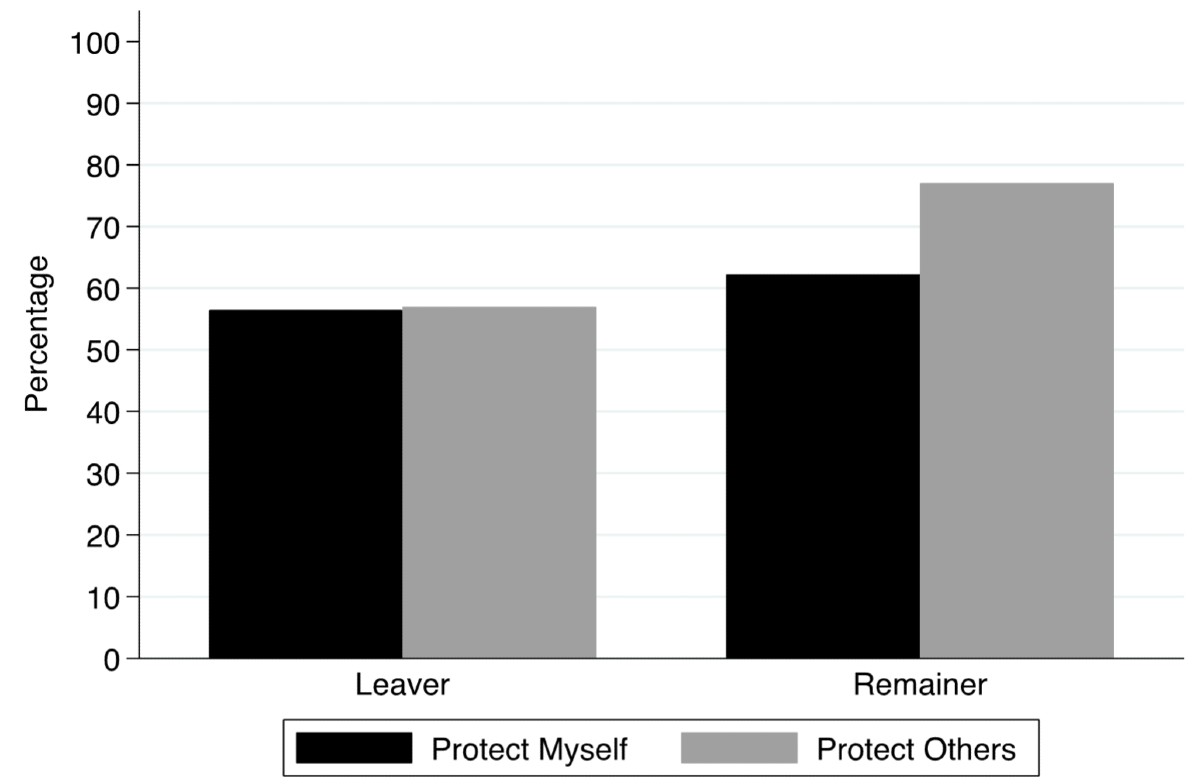
Source: Anderson and Hobolt / YouGov
High willingness to comply
The British public has paid a heavy price for the pandemic. Over 1 in 5 people told us they have been affected in various ways by the virus, including that they themselves or someone they live with had tested positive or had had symptoms, that they had lost their job or income as a result of the pandemic, or even that a friend or relative had died.
Public compliance with public health directives is crucial to the government’s ability to successfully manage the COVID-19 crisis. Our research shows very high levels of willingness to comply with guidance regarding face coverings. Notably, there is also no partisan divide – Conservative supporters and Leavers are just as willing to wear masks as Labour supporters and Remainers, although they may have slightly different motivations for doing so.
Notes
This research was generously supported by the British Academy (COV19\201414). The survey was fielded between 9-11 September 2020 and included a total of 3,276 respondents in England, Wales, and Scotland. We use the term “face mask” to refer to face coverings of all kinds that effectively limit the spread of the virus.
This post represents the views of the authors and not those of the COVID-19 blog, nor LSE.


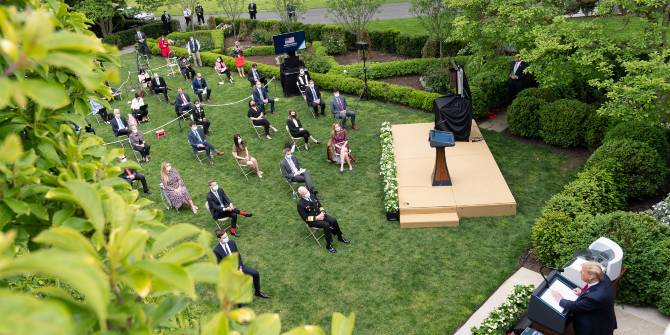



Now that mask wearing is no longer a legal requirement, expect things to get very political. There will be boycotts of shops and maybe even public transport outside of cities. It was obvious that Sadiq Khan was going to keep them on TFL as a way of defying the government. But I really don’t see why private companies like Sainsburys are trying to appeal to the woke. If they think that all of their customers are authoritarian Marxists they really don’t understand the UK outside of inner London.